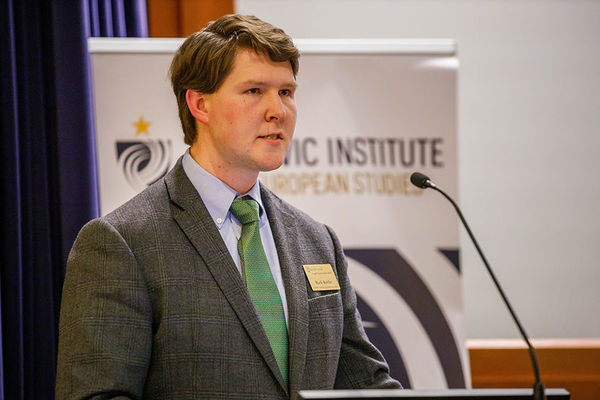
Mark T. Kettler, a postdoctoral research associate at the Nanovic Institute for European Studies, has been awarded the 2020 Huttenbach Prize for his first peer-reviewed article, "Designing Empire for the Civilized East: Colonialism, Polish Nationhood, and German War Aims in the First World War."
Since 2016, the Huttenbach Prize has been awarded annually to the best article published over the course of the previous year in Nationalities Papers, a Cambridge University Press journal. Kettler, a historian of imperialism and colonialism in Germany and Eastern Europe, says he is “honored by this recognition.”
“Germany is so often cited as one of the most important historical case studies for imperialism and ethnic violence. It’s imperative that we study it carefully,” says Kettler. “I hope this award will bring my research to the attention of a broader and more diverse group of scholars, and I hope that it will help inform further research about the German Empire, about imperialism, colonialism, and ideas of ethnic management in general.”
In his article, Kettler critically reexamines how Germans understood Poland during the First World War, and how these perceptions shaped debates about German war aims. He confronts recent scholarship that emphasizes the influence of colonial ideas and precedents on German imperialism in Eastern Europe. Kettler contends that during the First World War many influential imperialists refused to imagine Poland as colonial space and instead insisted that Poland was a culturally productive and politically sophisticated nation where many of the strategies of rule which shaped German colonial governance in Africa would be counterproductive. He further argues that this perception of Poland as a civilized nation convinced prominent German imperialists to promote multinational strategies of imperial rule in Poland, imagining an autonomous Polish state in permanent union with the German Empire.
Kettler finds that perceptions of Poland as a civilized nation were in fact far more influential in shaping German war aims than colonial frameworks. His research intervenes in larger questions about the evolution of German imperial practice, national identity, and the relationship of ethnic minorities to the modern state.
“The current wisdom is that German imperialists despised Poles, that they thought of Poland as barbaric, primitive, inferior. For many imperialists, that just wasn’t the case. How could it be? They had sat in the Reichstag with Polish politicians, they had seen Marie Curie win the Nobel Prize, twice. In WWI, many German imperialists couldn’t escape the conclusion that Polish society was culturally and politically advanced. They drafted their plans for imperial expansion accordingly.”
A 2012 graduate of Notre Dame, Kettler not only won the Department of History’s senior thesis prize but also the Nanovic Institute’s R. Stephen and Ruth Barrett Prize for Best Undergraduate Research Proposal.

Kettler credits the Nanovic Institute’s support of undergraduate research for helping to transform him from a passive learner into an active researcher and contributor to scholarly debates.
“Through a generous Nanovic grant, I was able to conduct intensive research in archives and state libraries in both Berlin and Munich during the summer after my junior year,” says Kettler. “It was such a privilege to dive into the archives. My Nanovic grant gave me invaluable research experience. By the time it came to start working on my dissertation, I wasn't flying blind.”
As a postdoctoral research associate, Kettler continues to develop and publish his own research on the development of German imperialism and approaches to managing cultural diversity. He is also working on a manuscript, provisionally entitled Knight, Death, and the Devil, which examines how the German Occupation of Russian Poland during the First World War transformed German assumptions about nationality, political loyalty, and imperial stability.
The Nanovic Institute for European Studies at the University of Notre Dame is committed to enriching the intellectual culture of Notre Dame by creating an interdisciplinary home for students and faculty to explore the evolving ideas, cultures, beliefs, and institutions that shape Europe. The Institute is an integral part of Notre Dame’s Keough School of Global Affairs.